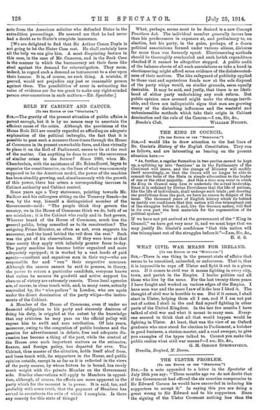RULE BY CABINET AND CAUCUS.
mo THE EDITOR Or THE "SPECTATOR.") Ent,—The gravity of the present situation of public affairs is patent enough, but it is by no means easy to ascertain the efficient cause of the. crisis. Although the provisions of the Home Rule Bill are usually regarded as affording an adequate explanation of the political imbroglio, the fact that it is possible to pass such a measure three times through the House of Commons in its present unworkable form, and thus virtually to place it on the Roll of Parliament, seems to lie at the root of the matter. Can anything be done to avert the recurrence of similar crises in the future? Since 1880, when Mr. Chamberlain, with the assistance of Mr. Sohnadhoret, began to organize the constituencies, on the lines of what was commonly supposed to be the American model, the power of the machine has been steadily growing, and, simultaneously with the growth of this power, there has arisen a corresponding increase in Cabinet authority and Cabinet control.
Some years ago a Tory statesman, pointing towards Mr. Balfour and his colleagues sitting on the Treasury Bench—he was, by the way, himself a distinguished member of the Government—said : "The people think they govern the country, we in the House of Commons think we do, both of us are mistaken; it is the Cabinet who really and in fact govern. Whoever heard of the House of Commons, much less the general public, being consulted as to it construction The outgoing Prime Minister, as often as not, even suggests his successor, and the hand behind the veil does the rest." Such was the gist of his observations. If they were true at that time surely they apply with infinitely greater force to-day. The party machine has become better organized and more adequately equipped; it is worked by a vast horde of paid agents—excellent and sagacious men in their way—who are responsible for and "run" their respective caucuses. Although the caucus cannot be said to possess, in theory, the power to return a particular candidate, everyone knows that unless he secures its goodwill and active support his chances of victory are extremely remote. These local agencies are, of course, in close touch with, and, in many cases, actually controlled by, the "wire-pullers" in London, who are again under the direct domination of the party whips—the instru- ments of the Cabinet.
A Member of the House of Commons, even if under no financial obligation to his party and sincerely desirous of doing his duty, is crippled at the outset by the knowledge that any criticism he may pass on the official policy will expose him to swift and sure retribution. Of late years, moreover, owing to the congestion of public business and the passion for advertisement in debate, free and adequate dis- cussion has become a thing of the past, while the control of the House over such important matters as the estimates, finance, and foreign policy, has departed for ever. The Cabinet, thus master of the situation, holds itself aloof from, and loses touch with, its supporters in the House, and public opinion outside, except in so far as it is reflected in the views of the party caucus, by whose fetters he is bound, has rarely much weight with the private Member on the Government side. Similar observations will apply to Members in opposi- tion, although, of course, the effects are more apparent in the party which for the moment is in power. It is said, too, and probably with some truth, that the payment of Members has served to accentuate the evils of which I complain. Is there any remedy for this state of things ?
What, perhaps, seems most to be desired is a new Corrupt Practices Act. The individual member generally incurs less than his predecessors in expenses at, and preliminary to, an election, but his party, in the guise, perhaps, of a dozen political associations formed under various aliases, disburse far more than was formerly spent. Electioneering methods should be thoroughly overhauled and such lavish expenditure checked if it cannot be altogether stopped. A public audit of the balance-sheets of all such associations as take a band in electioneering might afford some evidence of the disinterested- ness of their motives. The like safeguard of publicity applied to those vast and mysterious funds now at the sole disposal of the party whips would, on similar grounds, seem equally desirable. It may be said, and justly, that there is no likeli- hood of either party undertaking any such reform. But public opinion once aroused might make the change inevit- able, and there are indisputable signs that men are growing weary of the disturbing influences and the wasteful and nnbusinesslike methods which take their origin in Cabinet domination and the rule of the Caucus.—I am, Sir, 81c.,






































 Previous page
Previous page